SPECIAL ISSUE


2 NEWS Barista Bonding: Argo Tea employees share their experiences in life and at Fordham

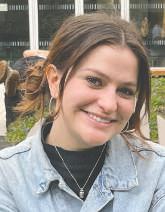
6 SPORTS & HEALTH
Desire to Drive: Fordham senior takes home gold in unofficial Formula 3 bid

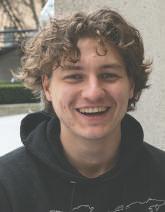
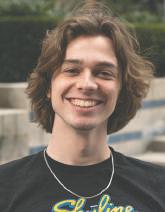
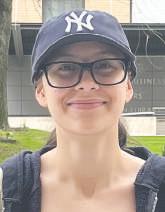

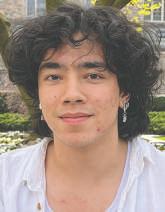

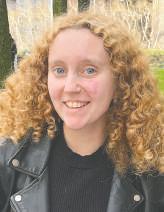
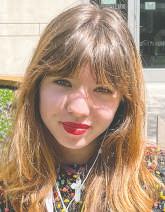

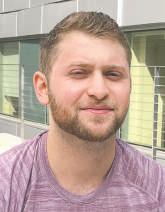
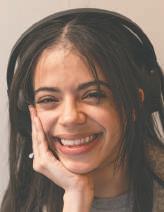
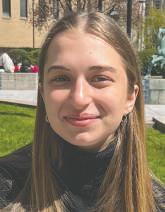

8 CENTERFOLD
Senior Spotlight: A snapshot into the lives of graduating student leaders
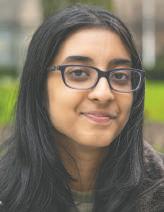
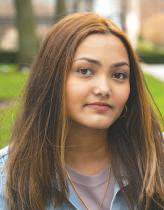

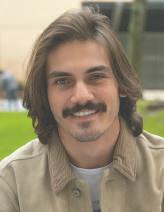


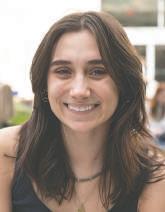
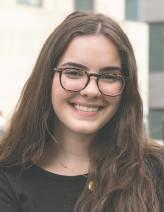


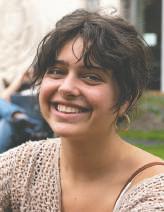
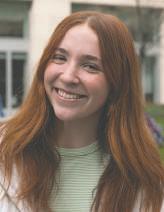
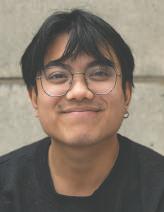

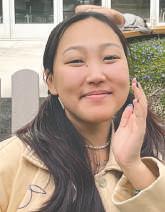

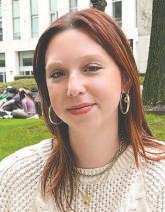
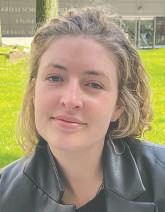
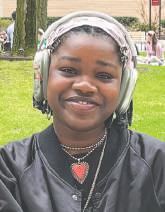
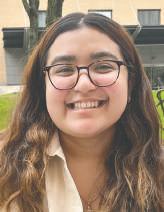
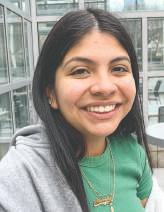

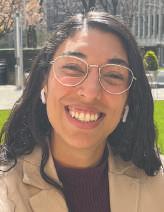
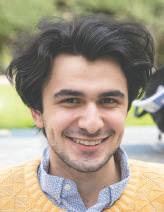
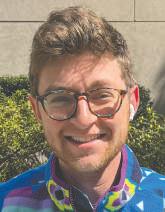

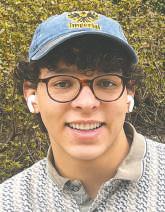

10 OPINIONS
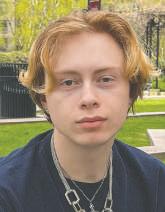
Terrific Tours: Everyone should join Lincoln Center Society to welcome prospective students
15 ARTS & CULTURE
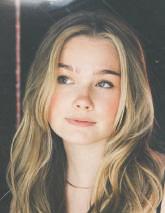
Drag Dance: Fordham Fashion for Philanthropy hosts event on Trans Day of Visibility
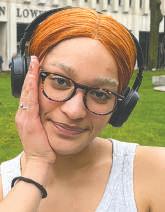
The STudenT Voice of fordham LincoLn cenTer Observer April 12, 2023 VOLUME XLIII, ISSUE 5 the
PHOTOS BY AURELIEN CLAVAUD, ANDREW DRESSNER, MOLLY HIGGINS, TARA LENTELL AND ALYSSA SHONK/THE OBSERVER
Argo Tea Employees Infuse Fordham With Energy
Ginger and Rosemarie shared their immigration stories and their experiences serving the university community at the Lincoln Center campus
By QUINCY REYES Asst. Copy Editor
Nestled in the garden-level lounge of the 140 West 62nd Street Building, Argo Tea has become a popular destination for students and faculty alike. The tea shop is known for its wide selection of drinks and the cozy atmosphere it provides. Beyond the caffeine boost, customers are also met with two of the lively employees who keep the cafe running — Ginger Tomala and Rosemarie, who asked that her last name not be shared due to privacy concerns.
Tomala and Rosemarie are known for their positive relationships and conversational approach with patrons of Argo Tea, but their stories go beyond the service that they provide; they are stories of resilience, inspiration and family.



Family Histories and Future Aspirations
Rosemarie immigrated to the United States from Jamaica when her mother was able to receive a permanent green card and validate her stay. Rosemarie noted that her mother was the first in the family to travel outside of the country, adding that she worked hard to provide her children with opportunities she did not have.
for their families continues to inspire them today. They added that they want to extend that care and ensure their own children have even more opportunities than they did.
Tomala noted that both she and Rosemarie attended New York City Technical College in Brooklyn from 1994 to 1995 but ultimately did not continue pursuing their education, which motivated them to work harder in order to provide better opportunities for their families.
“We only made it to the second year,” Tomala said. “We did our best to push our families to finish college.”
Reflecting on their own experiences, Rosemarie and Tomala emphasized their efforts to give their best to their families and inspire the students who frequent Argo Tea to do the same. Rosemarie noted that her daughter is currently a doctoral candidate, and Tomala shared that one of her daughters works in accounting and registration at Mater Academy Davenport in Florida, and her other daughter is a social worker.
Apart from their dedication to their families, Rosemarie and Tomala shared that they have several hobbies in which they enjoy partaking during their free time. Rosemarie mentioned that she enjoys shopping as well as people-watching, and Tomala loves to dance.
Experiences Working at Fordham and Student Interactions
“I love everything about them. What’s not to love?” Claire Fortier, Fordham College at Lincoln Center (FCLC) ’26, said. “I probably come here more for them than the coffee.”
“She was breaking ground, and she wanted her kids to be better than her,” Rosemarie said.
Tomala shared a similar experience to Rosemarie about her family’s move from Ecuador to the United States in the 1980s;
Tomala spoke about the sacrifices her mother made and the determination she had to provide her five children with the best opportunities possible.
Both Rosemarie and Tomala noted that their mothers’ perseverance to provide a better life
Throughout their time at Fordham’s Lincoln Center campus, Rosemarie and Tomala noted that they aimed to establish positive relationships and connections with members of the university.
“I try to do my best for you guys,” Tomala said. “It’s important that you always feel wowed and happy after coming.”
Students who frequent Argo Tea noted that the driving force behind their decision to stop by the cafe is their interactions with Rosemarie and Tomala. Some students shared that it is specifically their conversations with the two ladies that influence their patronage as opposed to the bakery items and drinks themselves.
Another student, Vivian Picciotti, FCLC ’24, added that after experiencing her first academic year at Fordham through an online-only teaching modality, being able to build connections with the Argo staff helped her acclimate to “feeling like my campus was more than a Zoom meeting.”
Rosemarie and Tomala noted that although working at Argo Tea allows them to interact with members of the student body and develop those connections, they are often faced with a fair share of challenges. They provided examples of having to handle items selling out and navigating the logistics of keeping the shop running smoothly during peak hours, when it is not an unusual sight to see lines of students snaking around the garden-level lounge.
The staff’s dedication to customer service and relationships with patrons has earned them recognition among students, who praise Rosemarie and Tomala’s attitudes toward the Fordham community.
At the Women’s Herstory Month Kickoff Luncheon on March 3, the Office of Multicultural Affairs presented Rosemarie with a Certificate of Appreciation that acknowledged the impact she has made on the lives of the students and community members she serves.
“It was my first award in school,” Rosemarie said. “I didn’t expect it, and for it to come from the students, I was blown away.”
Having been a part of the Fordham community for 13 years, Tomala and Rosemarie shared that they continue to work hard to achieve their dreams and noted that they both own properties and are proud of their accomplishments. The two encouraged students to carry their positive energy with them into the wider world.
“The Argo Tea ladies are always so welcoming and kind,” Miguel Pereira, FCLC ’25, said. “There have been several times where the line is backed up because we’re so involved in conversation.”
“You guys continue to be the greatest that you are,” Rosemarie said. “You guys show us a side of you that you should show to the rest of the world.”
2 News April 12, 2023 THE OBSERVER www .fordhamobserver.com
PHOTOS BY MARIANA LÓPEZ/THE OBSERVER
While working hard to keep Argo Tea running, Tomala and Rosemarie have formed relationships with countless students throughout the past 13 years.
“ It’s important that you always feel wowed and happy after coming. ”
Ginger Tomala, barista at Argo Tea
Tomala immigrated with her family from Ecuador to the United States in the 1980s in search of opportunities, and she emphasized her efforts to do the same for her daughters.
Rosemarie was awarded a Certificate of Appreciation from the Office of Multicultural Affairs on March 3 for the connections she has fostered within the Fordham community; she was “blown away” by the recognition.
“ You guys show us a side of you that you should show to the rest of the world. ”
Rosemarie, barista at Argo Tea


Fordham’s Language Professors Promote Cultural and Multilingual Engagement
Arabic Professor Mohamed Abdel Rahman and Japanese Professor Yoko Sakurai provide insight on expanding cultural awareness through learning another language
By ALFRED GREIG Contributing Writer
Fordham’s core curriculum requires most students to take language courses until they reach the exit level, which can take up to four semesters. The university’s modern languages and literatures department offers eight options, including Spanish, French, Arabic and Japanese, for students to fulfill this requirement. Fordham professors Mohamed Abdel Rahman, senior lecturer of Arabic, and Yoko Sakurai, adjunct lecturer of Japanese, discussed the impact languages have and the significance of studying languages inside and outside of the classroom.
“ Ustez has shown me that even if I am not the best speaker or reader, my love of the language can help my communication.”
Both Abdel Rahman and Sakurai delved into the importance of language education in building communication skills and social awareness when sharing their experiences in becoming educators.
Abdel Rahman was born and raised in Cairo, Egypt. Prior to becoming an educator, he studied law at Ain Shams University, also in Cairo, in 2003 and worked as a corporate and civil attorney for five years.
He immigrated to the United States in 2008 and, with a growing interest in sharing his culture and language with others, focused on developing his educational skills and teaching. He began lecturing at Fordham

Lincoln Center 13 years ago and studied law at Fordham’s School of Law in 2016.
Abdel Rahman — also referred to as Ustez by his students — now teaches all levels of Arabic, from beginner to advanced. He also instructs courses that focus on literature and specialized cultural studies within the Arabic language.
“I love my students, and I love the environment we have at Fordham. They are very open and eager to learn, so I enjoy teaching them,” he said. “We have a stress-free classroom; the students are relaxed. I am very lucky to have these students.”
He emphasized the importance of teaching a variety of core skills to students during each lecture, including reading, writing, speaking and listening.
As a language professor, Abdel Rahman added that it is crucial to interact with and adapt to the needs of his students. He explained that he refrains from lecturing or leaving students to attend to themselves. Instead, he checks in on students regularly, encouraging group work; reviewing their reading, writing and listening progress; and ensuring that every student is on the same page.
Abdel Rahman noted that learning a language can help with communication and interaction with other cultures. It is also a beneficial skill that many employers seek.
“Learning a foreign language is important for every single person; it opens up your mind to new things that you were not aware of,” Abdel Rahman said. “It opens up a lot of things for you.”
He gave the example of how some of his former Arabic students used their language skills to help teach English to Syrian and Yemeni child refugees who came to New York during the Syrian crisis.
Ilayda Vural, Fordham College at Lincoln Center (FCLC) ’25 and a student in several of Abdel Rahman’s courses, said that the professor is “incredibly caring and engaged with his students” and added that he has
helped her realize the benefits of learning Arabic in her future.
Vural added that after beginning her studies in Arabic with Abdel Rahman, she realized she can use her computer science degree in combination with her minor in Arabic to engage with Arabic-speaking communities and increase their access to computer science information and technology.
“Ustez has shown me that even if I am not the best speaker or reader, my love of the language can help my communication,” Vural said.
In Fordham Lincoln Center’s Japanese program, Sakurai teaches beginner to high-intermediate-level classes, as well
as various literature and culture-oriented classes.
Sakurai found her passion for language education and intercultural exchange during a study abroad trip to England while in college. During this time, she volunteered as a teaching assistant to a Japanese professor, which helped spark an interest in the field of education.
She has taught Japanese at
“ Teaching language has this potential to change the world. Maybe that’s an exaggeration, but we can start from here.”
lecturer
various colleges for over 20 years and is currently teaching programs in modern literature and film at Hunter and Baruch colleges in addition to her courses at Fordham.
“The beauty of teaching in New York City is that we are culturally diverse,” Sakurai said. “Through teaching Japanese language and culture, I want my students to better understand their own culture or other student’s cultures and to respect different cultures and values.”
Sakurai has also adopted an antiracist and social justice approach in her lessons. She presented an example on engaging with social issues in class, such as racism and gender inequality in Japan, to raise awareness as well as to promote collaboration among students.
“I want my students to look at problems in Japan and around them, and I want them to work on these problems. I know it’s difficult to find a solution if you’re just by yourself, but together with other people and other students, they can find a way to make things better,” she said.
Sakurai noted that she wants her students to be able to discern in which situations they can utilize Japanese. She emphasized that these topics and situations are more important than learning grammar without any context of how it is applicable outside of the classroom.

“Teaching language has this potential to change the world. Maybe that’s an exaggeration, but we can start from here,” Sakurai said.
West Gorman, FCLC ’26 and a student in Sakurai’s intermediate course, expressed that he enjoys the class because of her method of incorporating interesting aspects of Japanese culture into lessons. He called her a “really great teacher.”
Sakurai also spoke on the importance of taking advantage of the cultural experiences and opportunities that are unique to New York City’s diverse landscape. She gave the example of being able to watch live Rakugo, a traditional Japanese art of storytelling usually presented as a comedy performance that has existed for over 300 years.
She added that those in New York have access to authentic Japanese cuisine and cultural events, such as the Japan Day parade in Central Park and exhibitions hosted by the Japan Society.
Sakurai also expressed how immersion in other cultures should, at the end of day, be an informative and exciting experience for students.
“Studying a language should be fun. I want to reduce the pressure (on) the students,” Sakurai said.
Both Abdel Rahman and Sakurai are offering courses for the fall 2023 semester at the Lincoln Center campus, with Abdel Rahman teaching three courses and Sakurai teaching two. Abdel Rahman’s courses will include an “Introduction to Arabic” course, an “Intermediate Arabic II” course and an “Approaches to Arabic” course. Sakurai will be teaching “Introduction to Japanese I” and “Intermediate Japanese II.”
4 News April 12, 2023 THE OBSERVER www .fordhamobserver.com
Ilayda Vural, FCLC ’25
Abdel Rahman encourages a stress-free environment in his Arabic classes and emphasizes the importance of teaching multiple core language skills in each lecture.
Yoko Sakurai, adjunct
of Japanese
PHOTOS BY ANDREW DRESSNER/THE OBSERVER
Sakurai found her passion for language education while in college. In her classes, she encourages engagement with social issues and promotes collaboration among students.
Pat and Ruthie: Stories From Behind the Desk
By ANDREW ARMOUR Staff Writer
Across both the Lincoln Center and Rose Hill campuses, Fordham University has security members stationed outside entrances — as well as within residence halls and on-campus facilities — to monitor students and visitors as they enter and exit the premises. Pat Chisolm and Ruthie Swain, two members of the security team at the Fordham Lincoln Center (FLC) campus, explained how they ensure the safety of the university community and shared how their journeys led them to Fordham.
Chisolm was born in the Bronx and grew up in rural South Carolina before returning to the same borough in the early 1990s. She reminisced on her time as a “country girl,” recalling the scenery of the woods, animals and trees.
“I remember shaking pecan trees and bringing home pecans,” she said. “One day I’ll go back.”
Prior to working at Fordham, Chisolm was a personal shopper for seven years and pursued a career in cross-accounting. She shared that she went to Katharine Gibbs College in 1993, a now-inoperative business school located in New York City and has experience with government taxation. Eventually, however, she “got sick of always doing numbers.”
Chisolm added that her job as a personal shopper placed her in contact with a lot of clients who required security and protection of their own, which inspired her transition into working in security.
“After talking with their security and getting this experience,
I decided to go into the security field,” she said.
For nearly 10 years, Chisolm has been a member of Fordham’s security team and is currently stationed at the Lowenstein Outdoor Plaza entrance from 7 a.m. to 3 p.m. Known for her enthusiasm, she welcomes students Tuesday through Saturday and is known for her “Happy Friday” greeting at the conclusion of every work week.

Chisolm shared that she hopes to help inspire and motivate the student body and staff alike through personal interactions.
Along with her Friday greeting, she also includes a poster at her podium filled with encouraging messages. She explained that some people may have had a bad morning and she wants “to start the day off positive.”
Chisolm said she takes pride in her job, especially through her exchanges with professors, students and staff, because she remembers their names and they remember hers. She also enjoys welcoming visitors of the university’s campus to New York City, especially those embarking on self-guided tours, and wants to ensure that they feel at home by encouraging them to “see everything we have to offer.”
She also emphasized the joy her interactions with students have given her.
“I’ve learned over the years that the students are my gift; I don’t need anything under a tree,” she said. “They stop to say goodbye at the end of the day; they open their hearts to me.”
During her free time, Chisolm said that she likes to spend time at scenic spots around New York,
such as the Edge, an observation deck in Hudson Yards, because they allow her to reflect on her life and be close to the water. She particularly enjoys taking boat trips along the Hudson River.
“I love stopping to enjoy the sunlight,” she said. “Sunlight will always be free. The most valuable things will always be free. All of this will disappear one day. We have to enjoy these times. We must enjoy it while we can.”
She also noted that her favorite time of the academic year is the spring semester because she enjoys seeing students “relaxing and rewarding themselves for doing well in class” and described the birds and the flowers surrounding the atmosphere as “a plus.”
Working across the Outdoor Plaza from Chisolm on the second floor of the 140 West 62nd Street Building is Swain, another member of the security team at FLC. She can be found working from Monday to Friday between 7 a.m. and 3 p.m. Swain said that she enjoys the Outdoor Plaza’s view as

well as the Manhattan skyline and Central Park’s proximity to FLC.
Born and raised in Brooklyn, Swain earned a bachelor’s of science in criminal justice from John Jay College of Criminal Justice in 2018, which is located just one block south of FLC. She previously served in the U.S. Army and was also an airport security agent at John F. Kennedy (JFK) International Airport in Jamaica, Queens, from December 1998 to October 2019. In that role, she was responsible for inspecting vehicles that transport imports from aircrafts.
Swain recalled the high-stress experience of working at the JFK airport and compared it to her current responsibilities as a security guard at Fordham, noting how the two were drastically different from one another. She specifically cited working the morning of the Sept. 11, 2001, attack on the World Trade Center and the moments leading up to her hearing a noise and needing to evacuate from her desk.
She added that coming to Fordham allowed her to spend more
time with her family and introduced her to a quieter and slower-paced working environment.
“I had to get out in the cold; I spent 21 years outside in inclement weather,” she said. “The environment coming into Fordham allowed me now to pick up my 5-year-old grandson, Bop.”
Swain arrived at the university in January 2020 and mentioned that she is constantly excited to interact with visitors at her desk as they come and go. She also reflected on the level of professionalism and expertise that both the students and staff demonstrate toward the security staff as well as the greater Fordham community.
Both Chisolm and Swain spoke on their duties to protect members of the Fordham community and noted their appreciation of the student body. Swain highlighted that the goal of security personnel on campus is to both “care about the students and staff” and ensure the safety of the campuses’ members.
Andrew Dressner contributed additional reporting to the story.
New Club Supports Those Affected by Earthquakes in Türkiye and Syria
By KIA FATAHI Staff Writer
The Turkish Students Association (TSA) has led support efforts at Fordham University for survivors in Türkiye (the recently adopted name for the Republic of Turkey) and Syria in the aftermath of the Kahramanmaras earthquakes. The devastation — a series of three 7.8, 7.7 and 6.3 magnitude quakes that occurred on Feb. 6 and Feb. 20 — resulted in almost 50,000 lives lost and more than 164,000 collapsed buildings.
Within 10 days of the first earthquake, students of Turkish descent formed an ad hoc committee focused on collecting and distributing humanitarian aid. Since the committee’s formation on Feb. 16, its members have hosted fundraisers and participated in volunteer work in coordination with both the United Student Government at Lincoln Center (USGLC) and the
Turkish Consulate General in New York City.
TSA became a university-sanctioned club on March 22, allowing it to receive funding from the Student Activities Budget Committee, table and post flyers around campus, among other privileges.
Aysegul Yumusak, Fordham College at Lincoln Center (FCLC) ’24, is serving as the chair of USGLC’s Committee on Humanitarian Needs and vice president of TSA. As a Turkish American, she was inspired to work with other Turkish students in forming TSA after learning how many of her friends’ families were directly affected by the earthquakes.
“It was just upsetting to see the response to the earthquake and how people in America were reacting to it, because it felt like nobody cared,” she said. “I wish there was more I could do, but it’s painful to see that from here and not being able to support on the ground.”
The first members with whom Yumusak worked were Baris Karamanoglu, Gabelli School of Business at Lincoln Center (GSBLC) ’25; Lara Akçakaya, GSBLC ’25; Selen Tavli, GSBLC ’23; Sena Sari, FCLC ’26; Yasemin Cem, FCLC ’25; and Zeynep Helva, FCLC ’26. On Feb. 13, the students held a meeting with USGLC to discuss the formation of a group on campus that would address the demands of Turkish students. Three days later, Yumusak was voted as chairperson of the committee.
As of April 12, TSA has raised $3,089, or about 60,000 Turkish lira, in donations for Turkish Philanthropy Funds (TPF), a nonprofit dedicated to Turkish and Turkish American communities. Efforts to raise money included TSA's sale of plushies and baked goods, as well as flyers set up around campus.
Yumusak noted that while she appreciated USGLC’s support, she felt that the Fordham administration should have officially recognized the club sooner than it did.
Tavli, secretary of TSA, was born and raised in Istanbul and felt motivated to organize support and help after seeing a lack of response to the disaster from the university.
“I told my Fordham Turkish friends that we also need to do something,” she said. “Like ‘We can’t just sit here and do nothing. Let’s ask the school or talk to someone. Let’s start a club!’”

Aside from her friends at Fordham, she was also acquainted with Turkish students at Pratt Institute. She noted the discrepancies between Fordham and other universi-
ties in New York City regarding the administrations’ responses to the earthquakes, as the latter supported and made significant contributions to Turkish student-led groups.
Nearby universities such as the NYU Turkish Culture Association and the Columbia Turkish Association have raised over $80,000 in donations and $20,000 in donations respectively, with Columbia matching corporate contributions.
Yumusak attributed such disparities to “barriers” presented by the Fordham administration that prevent any emergency fundraising by student organizations, something she found “frustrating.”
These barriers include limited use of third-party apps to raise money, including Venmo or PayPal, because Fordham requires clubs to provide tax forms and a signed statement due to liability concerns.
To circumvent this, TSA accepted donations through the personal Venmo account of Sari, treasurer of TSA, and the donation link found in the club’s Instagram, both of which were directly linked to TPF.
“I’m grateful for the point that we got to, but it was upsetting to see other communities being able to help quicker than we were just because we had so many internal issues,” she said.
For Sari, the connection to home and the desire to help her community were pertinent for her. Like Tavil, she was born and raised in Istanbul and made the decision to pursue an education in New York at age 19, becoming the only member of her family to live outside of the country.
She recalled being told by a former classmate in Türkiye that her teacher, along with the teacher’s husband and their two children, lost their lives to the earthquakes. She said she felt “disconnected from reality” because she had no one to relate to or share this experience with.
At the Turkish Embassy, Sari had been working with classmates and Turkish compatriots to pack basic necessities, including winter clothing, food, feminine hygiene products and baby items, for families in Türkiye. She said her volunteer experience played a contributing role in maintaining regular contact with the Turkish community, which, in turn, uplifted her emotional well-being.
“I found my community better because people were also going through this grieving and (had the) same emotions as me,” she said.
Yumusak aims to coordinate with the student government in organizing more fundraising events this semester. She also urged Fordham faculty and students to contribute financially by giving their attention to the events in Türkiye and the Middle East.
“The Middle East in the last decade or so has had a lot of catastrophic events, and I think people forget sometimes that people there are human too, with real emotions and real experiences,” Yumusak said.
Information regarding the committee — as well as resources to donate — can be found on TSA’s Instagram, @fordhamtsa.
www .fordhamobserver.com THE OBSERVER April 12, 2023 News 5
COURTESY OF TSA
PHOTOS BY ANDREW DRESSNER/THE OBSERVER Pat Chisolm has been at Fordham for 10 years and is stationed at the Lowenstein Center Outdoor Plaza entrance.
The TSA club tables in the Lowenstein Center to raise donations for survivors of the earthquakes in Türkiye and Syria.
The two security personnel spoke on their previous work experiences and what led them to work at Fordham
Members of the recently established Turkish Students Association reflect on their process of organizing relief efforts and becoming a university-sanctioned club
Ruthie Swain, who joined Fordham’s staff in 2020, is located at the Plaza entrance to the 140 West 62nd Street Building.
Sports & Health
Former Super Bowl Champion Pursues Executive MBA at Fordham
LA Commuter Byron Chamberlain travels once a month to attend the Gabelli Graduate School of Business
By AURELIEN CLAVAUD Asst. Sports & Health Editor
Byron Chamberlain is not a typical Fordham student. In the 1990s, he won two Super Bowls playing for the Denver Broncos. In the 2000s, he ran the Byron Chamberlain Foundation to support underserved communities. And today, he is pursuing an executive master’s of business administration (MBA) degree at the Gabelli Graduate School of Business, which is located at Lincoln Center.

The executive MBA program is an accelerated two-year program that is condensed into long lecture sessions. This encourages the students — who are almost exclusively professionals in their fields — to be highly engaged and invested in the coursework. The classes demand a lot of notetaking, but Chamberlain said he enjoys the challenge.
“It’s a lot of material, so you’ve got to cram in a lot. That’s what makes it very unique and very challenging as well,” Chamberlain said. “You are trying to digest a lot of information and retain it.”
Chamberlain currently lives in Los Angeles and commutes once a month, flying with a classmate into New York City to attend classes and immerse himself in what he calls “the on-campus, in-classroom feel,” something that was essential to him. Chamberlain also cited the respect and honor the program has as important sources of pride for him.
“When I tell people I’m at Fordham, their eyes light up because of the respect that the university has,” Chamberlain said.
He has also enjoyed meeting and working with his classmates. The challenging material is balanced by interesting group work and the productive atmosphere of a classroom with approximately 20 students, according to Chamberlain. Working with people from all backgrounds sparks Chamberlain’s passion. He has bonded with his cohort, and they often engage socially outside of the classroom.
“There’s people working in finance and business. I have a friend in the cohort who works for the New York Knicks,” Chamberlain said. “We’ve made genuine friendships; I’ve been to a couple of Knicks games.”
The degree is a goal of Chamberlain’s, as he wants a breadth of opportunities to open up for him. Looking to expand his career, he thinks the versatility offered by the degree is one of its best attri-
butes. He originally began the program in 2019 but took leave due to the COVID-19 pandemic.
“I just didn’t feel comfortable at that time traveling across the country,” Chamberlain said. “A lot of unknowns back then, a lot of information and misinformation out there.”
He remained in contact with Francis Petit, the program director, and returned in 2023 to work toward completing the degree.
Despite the long commute — with jet lag between the West and East Coasts being an exhausting factor — he persists. It’s a natural effect of the way he sees the world, shaped by his experience in the NFL.
“I feel like anything that’s worth achieving is going to be difficult,” Chamberlain said. “You’re going to have to make some sacrifices and have some uncomfort-
able moments at times.”
His journey, marked by a long and successful NFL career, was far from easy. He was a highly touted tight end coming out of high school and was recruited by several big-name schools in some of the toughest conferences — Pacific-12, Atlantic Coast Conference and the Big Ten. He chose the University of Missouri for its broadcast journalism program and spent three years there. He wasn’t entirely comfortable there and transferred to Wayne State College in Nebraska. The smaller institution allowed him to focus on his academics, and he was drafted by the Denver Broncos in 1995; he returned to Wayne State and completed his undergraduate degree in 2008 after retiring from the league. He played for the Broncos from 1995 to 2000, winning both the 1998 and 1999 Super Bowls. There, he played with football legends including Shannon Sharpe and John Elway. He witnessed a team and an organization committed to excellence, and it paid off for him in the long run.
“(Those early years) were a formative experience because I saw how a first-class organization is run,” Chamberlain said of his Super Bowl years, which he argued began when he first joined the team, as Head Coach Mike Shanahan built up the roster.
Chamberlain then left for the Minnesota Vikings where he played some of his best football and then played for the organization now known as the Washington Commanders. He finished his career back where he started — with the Broncos — before retiring in 2005.
In 1999, Chamberlain created his foundation. From then until 2012, he raised money partnering with other foundations to give back to underserved communities. He worked with Magic Johnson’s foundation to raise money to fight HIV/AIDS and Soles for Souls, a nonprofit that sent over 100,000 shoes to African nations in 2012.
“There are people that truly need help, and they are everywhere,” Chamberlain said. “I have been blessed with so many opportunities that I had an obligation to help those underserved people. It brought me joy to be in that position.”
When thinking about Fordham, Chamberlain believes he brings a unique perspective to the university and the Gabelli program. “I understand how organizations are run, successful ones as well as dysfunctional ones, because I have been part of both,” Chamberlain said. “I know the difference, and I see the difference.”
It invariably impacts the material he learns in the classroom. He has experienced many events and movements across all echelons of an organization, and it is exciting for him to actually study it in a classroom setting. The theory and practice come together.
Chamberlain called the executive MBA program one of the best academic experiences he has ever had. Surrounded by people of all backgrounds, he believes the collaborative and communicative courses are the greatest aspects of the work he does at Fordham.
“I think that’s the biggest thing about the program for me: It’s the people,” Chamberlain said.
Senior Wins Formula 3 Race in Abu Dhabi
By TARA LANTELL Layout Editor
Have you ever wondered what it would feel like to fly down a road at 136 miles per hour? Mahidur Rahman, Fordham College at Lincoln Center ’23, can tell you. In fact, he’s won a race doing it. The Fordham student recently won his first unofficial Formula 3 (F3) race in Abu Dhabi, United Arab Emirates.

Rahman became interested in racing a year ago through friends who were go-kart racers, and he trained for F3 races using computer simulators. These simulators are meant to imitate all aspects of the race by including a real steering wheel and pedals. However, they fail to emulate some of the physical aspects of racing.
Rahman took the plunge and participated in his first amateur race on March 14, 2023, at the Yas Marina Circuit in the sunny, 95-degree weather of Abu Dhabi after spending over six months practicing that track. It was an unofficial F3 race, which is where amateur racers have the opportunity to prove their skill and attract sponsors.
Once drivers have their official certification, they can participate in Formula racing competitions sponsored by the Federation Internationale de l’Automobile (FIA). The Yas Marina Circuit is about 1.36 miles in length, and F3 drivers complete 15 laps per race. For comparison, Formula 1
drivers drive between 50-70 laps to reach the required 190 miles.
“I was really taken aback when I actually was racing because doing the simulator races versus the real-life races, it’s a lot different,” Rahman said. “You’ll face g-forces that are almost eight times your own body weight.”
The g-forces and extreme heat of live racing make the whole event a sweaty and physically challenging affair. The impact is no joke — F1 drivers lose around 6 to 8 pounds of water weight after every race.
After training for months on the at-home simulator, Rahman signed up for an amateur F3 race. He was set up with a car and an experienced team that gave him live pointers throughout the event and helped him during times of distress, such as the qualifying round.
The qualifiers determine his starting position in the finals. Not only was this Rahman’s first time in an F3 race — it was his first time in a formula car at all.
Rahman felt that he was just getting comfortable in the car when things started to go wrong.
“I was just getting a feel for the car itself and trying to set lap times, and halfway through, my car completely died, and I spun out on the racetrack,” Rahman said. “All I was smelling was major heat, and the car’s battery completely malfunctioned.”
Luckily no one was hurt, but the car malfunction meant that
Rahman would start in 10th place on race day — dead last. In the end Rahman did not complete the qualifier and had to be towed back by the safety car. Despite this, he said he still felt confident about the race itself.
In F3 races, it is the first couple of laps where drivers are closest to each other and where most of the battles happen between competitors. While the cars in front of Rahman battled each other on tight corners and maneuvered riskily, he trailed closely behind while letting his tires warm up. Cool tires have less traction on the asphalt and make it harder to control the vehicle at faster speeds.
Once the tires were warmed up, Rahman made his moves. Maneuvering deftly around the track, he was able to slipstream off the other drivers and overtake them. Slipstreaming is when a driver gains an aerodynamic advantage by positioning themselves directly behind an opponent. The driver in front takes on the wind resistance, slowing them down. With the help of his team and the use of his strategic game plan, Rahman was able to move into first position by the 11th lap and coast for the rest of the race.
Apart from his racing ability, Rahman gave credit to the team behind him for his victory. As he raced, they told him whether he needed to slow down or speed up based on the charts available to
them. These charts monitor heat temperatures, braking points and the car’s entry speed on corners.
Despite the challenges of the qualifying round and the extreme heat, Rahman won his first race.
“Honestly, the actual race day felt a lot easier and less hectic,” he said.
In the future, Rahman hopes to get his certification at a racing school so that he can compete in races organized by FIA and hopefully find sponsors and a team
of his own. For now though, he plans to practice as much as he can on the simulators and focus on setting better lap times.
Until he can get back out on the track, he plans to remember his favorite part about racing: “The aerodynamics of the racecar — it’s like an upside down jet plane. The feeling of that is amazing because it feels like your car is built onto the ground while your body is flying in the air, so that experience — it’s electrifying.”
Sports & Health Editor Gabriella Bermudez April 12, 2023 THE OBSERVER
COURTESY OF BYRON CHAMBERLAIN
Chamberlain draws a lot of parallels between his clasroom work and the experiences he has had within various organizations.
AURELIEN CLAVAUD/THE OBSERVER Rahman reigned victorious in the Abu Dhabi Formula 3 race, despite a setback in the qualifier.
Mahidur Rahman competed in his first live race, hoping to kick off a succesful future in motorsports
Megan Jonassen Reflects on Career and Injury
The star forward for the women’s basketball team grappled with her legacy following her ACL tear
By AURELIEN CLAVAUD Asst. Sports & Health Editor
“It’s not how I wanted to end my career,” Megan Jonassen, Graduate School of Arts and Science ’23, said. “But I realized it could have been so much worse. I was lucky to play for four and a half years, so I am trying to be grateful.” It was February, nearly a month after a serious ACL tear put her out of action for the rest of the year. Since then, Jonassen has had a lot of time to reflect on that career-altering moment and her legacy with the Fordham women’s basketball program.
On Jan. 18, in the seventh minute of play against the University of Massachusetts, Jonassen fell. This isn’t uncommon in a physical basketball game, but it was concerning when she didn’t immediately get up. The Rose Hill Gymnasium fell silent as the game stopped. The white-out game, a celebration of school spirit, had taken a worrisome turn. For teammate Kaitlyn Downey, Graduate
School of Arts and Sciences ’23, it was a frightening experience.

“I was looking down the court, and I was yelling in my head ‘Meg, get up off the floor!’” she said. “Because Meg is someone that is such a tough player and is always resilient.”
As the information started to come in and the diagnosis became official, it quickly set in as a gutpunch to the program. For five years, Jonassen was an enormously impactful presence in the paint. Her competitive fervor and serial ability to reel in rebounds and contest shots across all five positions are some of the skills tout-
ed by Candice Green, the rookie head coach for the program.
“She brings a lot of energy and effort onto the court,” Green said. “She’s our hustle player. She does a lot of things that you don’t necessarily see in the stats.”
Beyond her direct impact on the court, Jonassen is one of the premier leaders for the Rams. She brings energy, confidence and a veteran voice to the team. Having to sit out so early in the conference schedule hurt the Rams, who were preparing to make a deep run in the end-of-season tournament. The Rams had a strong record of 12-7 with Jonassen in the lineup.
After her injury it was clear Fordham missed the forward. However, the team performed admirably in her absence posting a record of 7-6. The Rose Hill team made it to the quarter finals of the Atlantic 10 (A10) postseason, having settled into third place in the standings by the time March rolled around.
A lot of that has to do with the impact she had on the sidelines. Jonassen traveled with the team and attended as many games as possible, working around her surgery and physical therapy in order to continue to give the team her all.
Her teammates have supported her throughout the recovery process. They’ve done mental health check-ins and helped her out regularly. Many of the women’s basketball players live together, and even those that live separately get along well. It made for a caring and supportive environment as Jonassen worked through a long physical therapy regimen.
As the years went by, Jonassen enjoyed progressively more time on the floor. Although the COVID-19 pandemic cut the 2020-21 season short, she nestled into a starting role as she cemented her offensive rebounding ability. That year, she hauled in more boards on that end of the floor than on defense.
Due to the COVID-19 pandemic, the NCAA allowed all student-athletes to retain an extra year of eligibility, meaning that Jonassen had an opportunity to keep shining into her graduate education.
In the 2022-23 season she led the team as a captain for the second year in a row. Her leadership has had a profound impact on her teammates. Even after she was sidelined by the injury, she continued to be one of the most vocal people in team huddles and an enthusiastic cheerleader for the Rams.
“I’m obviously not practicing, but showing up on the sideline and giving them support is something that I have really been focusing on,” Jonassen said. “Basketball is a game of highs and lows. When you are low you need to instill confidence in yourself and your teammates.”
“We miss her in practice because she has such a big voice,” Green said. “She obviously can still do that from the sideline, but I think it’s just harder for Meg because she leads by example.”
And with this support, Jonassen continued to embody the character and performance that she delivered her entire career at Rose Hill. She began her time at Fordham in the 2018-19 season with her foot on the gas. She played in 33 games and recovered over 50 offensive rebounds. That year, she was a rotation player, serving as a backup for starter Mary Goulding, Fordham College at Rose Hill ’19, in the forward position.

It was also in 2019 that the team won the A10 championship and played the No. 12 seed, Syracuse University, in the NCAA Division I women’s basketball tournament. For fans of Fordham basketball, it was one of the most successful years in recent memory. For Jonassen, it was a defining moment in her career.
“She’s done a great job off the court of just being a good role model,” Downey said. “She’s never had a ‘pity me’ mentality about this at all. She’s had to adjust and contribute in a different way for the team.”
After a successful year, the women’s basketball team is preparing for another season and an even deeper run. Meanwhile, Jonassen’s surgery was a success, and she is walking well. Despite the unfortunate cutoff to her season, she is one of the best players the women’s basketball program has fielded.
She averaged 4.7 rebounds per game and totaled more offensive boards than defensive in three of her five seasons. In her final year, her free throw shooting improved dramatically, going from a 60% average to an 80% average. She played in 129 games and scored over 500 points.

Her statistical impact will be missed, as well as her presence in the locker room. Even as the team looks forward, it is clear that the legacy she leaves behind is valuable and transcends whatever obstacles came in her way.
“We all look at it from a point of view that ‘Wow, anything can be taken away at any moment,’” Green said in February. “We have to play every game super hard because she doesn’t get to play. We’re doing it for her.”
www .fordhamobserver.com THE OBSERVER April 12, 2023 Sports & Health 7
On Feb. 19, Jonassen is honored during Senior Day. Her family, coaches and athletic staff posed for the photo.
“ Basketball is a game of highs and lows. When you are low, you need to instill confidence in yourself and your teammates.”
Megan Jonassen, GSAS ’23
PHOTOS COURTESY OF VINCENT DUSOVIC VIA FORDHAM ATHLETICS Jonassen was having her best season before her ACL injury. The forward adapted well in helping the team from the sidelines.
“ She brings a lot of energy and effort onto the court. She’s our hustle player. She does a lot of things that you don’t necessarily see in the stats.”
Candice Green, head coach
Congratulations to the Class of 2023!
Note From the Editors


This spread features self-written biographies from seven seniors at Fordham College at Lincoln Center (FCLC) and Fordham College at Rose Hill (FCRH). Seniors, know that if we could, we would make space to highlight each and every one of you and what you have accomplished during your time at Fordham.
Allie Stofer | Editor-in-Chief Maddie Sandholm | Managing Editor
Isabelle Buneo

Born and raised in Verona, New Jersey, Isabelle Buneo specializes in both English and dance at FCLC. Throughout her four years in the Ailey/Fordham BFA program, Buneo has had the opportunity to train with and learn repertoire from an array of incredibly talented individuals in the field; she has emerged with an understanding of her artistry that she will take with her everywhere she goes. Her time as an English major has also helped her foster an even more profound love for literature, and her experience as an editorial intern at NewBeauty
magazine and a teaching assistant at the Gabelli School of Business over the past year has helped her to discover her passion for both journalism and academia. Buneo hopes to continue working in editorial journalism after graduation and to one day pursue a master’s degree in English literature. Above everything else, the best part of her experience at Fordham has been the people she has met along the way, who have helped her to find herself — without them, she would not be here. Congratulations to the entire Class of 2023!
Michaela Carter
“First off, I want to say thank you to the Fordham community and the Athletic Department for everything that you have provided me over the past four years. I really went out on a limb coming across the country to come to school and play softball here, but I never once regretted it.”
When Michaela Carter stepped on campus four years ago, she never thought that the school and the people at Fordham — especially the people within the Athletic Department — would have such a positive impact on her life. Hailing from Duvall, Washington, and attending FCRH, she joined the women’s softball team, and her teammates and coaches have had the biggest influence on her time

here. The friendships that she’s made and the family that they have built as a team is something that she will forever cherish and remember. The grind as a student-athlete has allowed Carter to grow into a more independent and disciplined individual. With the lessons she’s learned and connections that she has built, Carter has the foundation to reach any goals in her future.
Bryson Kernan Clark
Bryson Kernan Clark is a double major in Spanish and visual arts. Born and raised in Fort Worth, Texas, he discovered his passion for art and design at a young age. He moved to New York City when he was 18 to continue his work as a designer. He has extensive freelance experience in graphic design,

photography, studio art, calligraphy, interior design and event planning. He loves to be in nature and has filled his studio with houseplants. Next year, he will attend the Gabelli School of Business for his master’s degree, in pursuit of the goal of starting and running his own design firm.

“Thank you to my friends, family and boyfriend for their unwavering support and encouragement. Another huge thank you to my teachers for guiding, mentoring and inspiring me. Finally, a shoutout to myself for the hard work and dedication that brought me to this point.”
“I don’t know if I’ll make it, but watch how good I’ll fake it / It’s alright, alright, tonight, tonight.” — Hot Chelle Rae
COURTESY OF FORDHAM ATHLETICS
COURTESY OF BRYSON KERNAN CLARK
COURTESY OF ISABELLE BUNEO
Sophia Henderson
Sophia Henderson is an FCLC honors student double majoring in film and television and new media and digital design. She is originally from Ashburn, Virginia. One of her most important roles at Fordham is serving as the president of the Black Student Alliance (BSA). As a Black woman coming into Fordham, it was essential for her to be a part of the community. BSA has consistently supported her when she has faced issues with being at a predominantly white institution. Henderson wanted to continue the work that made
her feel so comfortable in a new environment, so she ran for an E-Board position in her first-year. Throughout her years at Fordham, she grew and developed with BSA as a community-oriented person passionate about serving others. BSA has been her home at Fordham for the past four years, and she has gained friendships and had amazing experiences through the club. She continues to work toward making sure that BSA is a space where Black students can exist without the external pressures that come with the identity.
Abigail Lo

Abigail Lo is graduating with a degree in theater performance and humanitarian studies — a very silly (and possibly unemployable) combination of majors. As an active part of the theater community, they spent most of their college career assisting designers on studio shows and agonizing over the next set to be built in the scene shop. When they’re not wearing their theater hat, Lo’s most likely trying to make a dent in the piles of nonfiction books they own and

simply have not read yet. Hopefully, their post-graduation future involves something along the lines of theater administration or policy advocacy — but who knows? They’ll probably end up going to law school because firstly, they’re very passionate about dismantling the violence baked into American immigration policy, and secondly, they already have a 175 on the LSAT, so they may as well live out their Elle Woods dreams.
Julia Mailczanowski
Originally from Cape Cod, Massachusetts, Julia Mailczanowski is studying natural sciences with a concentration in cell and molecular biology at FCLC; she also has minors in philosophy and psychology. Mailczanowski has been a member of Lincoln Center Emergency Medical Services (LCEMS) since the club was revived about a year ago. Before then, she was a member of Fordham University Emergency Medical Services (FUEMS) at Rose Hill and was sponsored by FUEMS to attend emergency medical technician (EMT) school. She thought it was important to have a club about EMS at Lincoln Center, especially because many students do not know that Fordham has its own EMS agency in the Bronx; for those who

do know, the process of joining FUEMS as a Lincoln Center student can be daunting. Since she joined the E-Board of LCEMS, she has focused on outreach to grow the club. LCEMS has had a substantial increase in active members over the past year, and this semester, more students are attending EMT school through FUEMS than ever before. Looking forward, the club is beginning the process of creating a first responder agency at FLC to mirror FUEMS at Rose Hill. She is confident in the incoming E-Board to carry the torch and to bring free emergency medical care to the Lincoln Center campus. She can’t wait to see how LCEMS continues to grow!
Abrar Mohamed



Abrar Mohamed is the vice president of Fordham Lincoln Center’s Muslim Student Association (MSA). She is a commuter from Queens, majoring in psychology and minoring in new media and digital design at FCLC. MSA has been a very important part of her college experience. From being a member to becoming the vice president, her involvement in MSA has been an incredible opportunity to share her faith and culture with others

and promote cultural understanding and awareness on campus. It has also allowed her and other club members to build a strong community and bond with each other, creating a safe space on campus for everyone to be comfortable. She is grateful for the friendships and memories that she has made as a part of this club, and she looks forward to seeing how it continues to thrive in the years to come.

“Shoutout to my friends for always showing up to my events and constantly supporting me!!! Thanks for making this a very memorable senior year!”
“Thank you to my friends and family for always supporting me and making this a special and memorable four years. Love you much!”
“It always takes more courage to be kind than cruel. (Also, peach on the beach is the only smoothie flavor to ever exist.)”
“Take life in little doses and focus on the present. Life passes by fast. Savor the moments you get.”
COURTESY OF ABIGAIL LO
ANDREW DRESSNER/THE OBSERVER
ANDREW DRESSNER/THE OBSERVER
ANDREW DRESSNER/THE OBSERVER
Welcoming Future Faces to Fordham
LCS is a highly influential organization at Fordham, and more students should consider giving tours
ANDREW ARMOUR Staff Writer
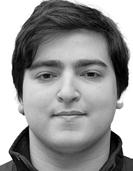
It was around one year ago that I was looking at where I’d end up attending college. As a senior in high school, I enjoyed taking tours of universities and imagining myself studying on their campuses.
These tours were often very similar to each other. Each began with a presentation featuring photos of smiling students walking around the community. There were books and pamphlets to place in prospective students’ bags, each inscribed with a logo or inspiring tagline (for example, Fordham’s line, “New York is my campus, Fordham is my school.”) I would spend time walking through beautiful buildings that looked like they could be the headquarters for a tech company. Tour guides would gesture toward statues of school founders that most current students pass without a glance.
Nothing is wrong with that polished tour experience; it is part of the traditional college application process. But an essential part of choosing a college is learning about the authentic and unique student experience at each school. A student tour guide can help prospective students understand what it is like to be at their university.
With two unique campuses, students are able to meet many new faces and join clubs that aren’t offered here at Lincoln Center.
Because of how much I loved going on college tours, I knew from my initial moments at Fordham that I had to be a part of the Lincoln Center Society (LCS) — a fancy name for the group of student ambassadors who give tours of Fordham Lincoln Center (FLC) to potential students and their families. Since joining, I have found that LCS has a major influence on campus life, and more students should consider participating.
LCS shares the real scoop of FLC. The best tour guides tell prospective students information that the
brochures don’t share on their own. Most people don’t come to visit our campus for a sheet of available majors and minors. Instead of rattling off a boring list, I love mentioning intriguing topics I’m currently studying in class, like medieval patterns of courtly love, the four-paragraph lede, U.S. foreign affairs, the music of Bad Bunny, and drawing theological parallels to the film “A Serious Man.”
Many tour attendees ask me what I do after class, and I highlight all the unique aspects of my extracurriculars. I’ll tell my guests about my experience seeing “Camelot” on Broadway with my Arthurian literature class, participating in Shabbat with the Jewish Student Organization, and perfecting my craft with fellow contributors at weekly Observer meetings. Like the introductory presentations always say, there’s something for everyone at Fordham, but you might not be fully convinced of that without the perspective of a real student.
My favorite part of giving tours is learning about the future faces of Fordham.
LCS tour guides act as some of the first people that our guests see on their Fordham journeys, so it is vital to be hospitable. We go to great lengths to show visitors that we appreciate their visit to campus and can help answer any questions they may have.

Sometimes, I have to answer tough questions, but I don’t lie or shy away from answering anything, since my answers may actually encourage students to join our community. As a club, we practice our responses to difficult questions. For example, a club leader challenged us to answer how Fordham is different from other competitive schools in New York City. My group determined we’d tell our hypothetical guest that FLC is a midsize university operating in a shape close to a square. This creates a close-knit community, since Fordham offers a small-campus feel in a big city. Students run into each other and stop to say hello or have a conversation in the halls and elevators, creating a warm environment for learning.
With two unique campuses, students are able to meet many new faces and join clubs that aren’t offered here at Lincoln Center. FLC students have the choice to take up to 40% of their classes at the Rose Hill campus. Rose Hill offers more traditional, picturesque college grounds — it was even featured in the Albert Einstein Verizon ad.
College applications are a stressful time for everyone, but touring colleges can help prospective students get excited about their futures.
We also remind students there’s often no need to walk far between classes at the Lincoln Center campus — most liberal arts classes are in the Lowenstein Center, and most business classes are in the 140 West 62nd Street Building. I love showing guests how the buildings on campus, except for Martino Hall, are all connected at street-level. During the cold winter months, you normally don’t even need to go outside to get from your dorm to class. My favorite part of giving tours is learning about the future faces of Fordham. Hearing guest experiences about visiting siblings in the city, interests in specific departments in our school, and trips to New York from the Midwest allow tour guides to get a head start on learning about incoming students. Their interests and talents will shape Fordham throughout their college years, and I love being able to meet them first.
I am not alone in my passion for being a tour guide. There are over 50 at FLC, the majority of whom hold volunteer positions. We must meet time-consuming requirements, including an interview, a questionnaire, weekly tours and monthly meetings, but it is all worth it for the opportunity to introduce prospective students to our beloved campus.
College applications are a stressful time for everyone, but touring colleges can help prospective students get excited about their futures amid the uncertainty. Being a student tour guide allows me to share in this excitement all over again by giving a warm welcome to our future community.
Observer the Editor-in-Chief Allie Stofer
Managing Editor Maddie Sandholm
Online Editors Emily Ellis Kreena Vora
Creative Director Alexa Stegmuller
Advertising Coordinator
Luis Castellanos
Layout Editor Tara Lentell
Asst. Layout Editors Alyssa Shonk
Giada Evangelista
Photo Editors Alyssa Daughdrill
Andrew Dressner Asst. Photo Editors Aurelien Clavaud
Molly Higgins
Head Copy Editors Ana Kevorkian
Alyssa Macaluso Nora Reidy Asst. Copy Editors Smile Butt Grace Ehle Quincy Reyes
News Editors
Maryam Beshara
Insiya Gandhi Asst. News Editors
Alexa Villatoro Megan Yerrabelli
Sports & Health Editor
Gabriella
Asst. Social Media Editors
Chelsea Casilla
Shelby Williams
Multimedia Editors
Lauren Bocalan
Alice Moreno
Asst. Multimedia Editors
Riley Kraus
Maria Terzulli
Podcast Hosts
Shaily Jani
Morgan Johnson
Christian Madlansacay
Podcast Producer
Brianna Doucette
IT Manager
Zayda Bleecker-Adams
Editorial Adviser
Richard Rosen
Visual Adviser
Jessica Green
Opinions articles and commentaries represent the view of their authors. These articles are in no way the views held by the editorial board of The Observer or Fordham University.
The Editorial is the opinion held by a majority of The Observer’s editorial board. News Editors do not contribute to the creation of the Editorial. The Editorial does not necessarily reflect the views held by Fordham University.
The Observer is published on alternate Wednesdays during the academic year. Printed by Five Star Printing, Flushing, N.Y.
POLICIES AND PROCEDURES No part of The Observer may be reprinted or reproduced without the expressed written consent of The Observer board. Letters to the Editor should be typed and sent to The Observer, Fordham University, 140 West 62nd Street, Room G32, New York, NY 10023, or emailed to editor@fordhamobserver.com. Length should not exceed 200 words. All letters must be signed and include contact information, official titles and year of graduation (if applicable) for verification. If submitters fail to include this information, the editorial board will do so at its own discretion. The Observer has the right to withhold any submissions from publication and will not consider more than two letters from the same individual on one topic. The Observer reserves the right to edit all letters and submissions for content, clarity and length.
Bermudez Asst. Sports & Health Editors Charles Binns Aurelien Clavaud Opinions Editors Ava Peabody Isabella Scipioni Asst. Opinions Editors Jake Eraca Laura Oldfather Jessica Yu Arts & Culture Editor Isabella Gonzalez Asst. Arts & Culture Editors Julia Jaramillo Aditi Praveen Kariyanahalli Avery Loftis Features Editors Matthias Lai Erika Tulfo Asst. Features Editors Lola Cravath Madeleine Signore Fun & Games Editor Irene Hao Social Media Editors Alexa Villatoro Eeshita Wade
COURTESY OF ALLIE BEEKMAN
University President Tania Tetlow, J.D., poses with members of Lincoln Center Society, the student organization that runs campus tours.
Opinions Editors Ava Peabody Isabella Scipioni April 12, 2023 THE OBSERVER
Opinions
Setting Your Own Pace in the Internship Race

Dealing with the pressures and obstacles of internship culture at Fordham is no easy task
SABRINA PORTNOY Contributing Writer

College is meant to be a time for growth and exploration. However, Fordham’s internship culture has turned it into a race to the finish line.
On my tour of Fordham University as a junior in high school, one of the first things mentioned by my tour guide was that 89% of Fordham students have at least one internship before they graduate. I vividly remember my mom, who was on tour with me, looking over and giving me two big thumbs up and a smile.
For many people, including myself at the time, one of Fordham’s greatest appeals is its focus on students getting work experience prior to graduation. The university advertises its strong alumni network and Handshake access to current and prospective students. As a student at the Gabelli School of Business, I receive about 10 emails per week from the school’s Personal and Professional Development Center (PPD) telling me about new networking opportunities and panels I can sign up for in order to meet others in my field of interest and gain valuable work experience.

Within my first week at Fordham, I scheduled an appointment with PPD because I felt like I was already falling behind in my search for an internship. I was immediately bombarded with documents explaining how to write a cover letter and perfect my resume — even as I was still getting lost in the Lowenstein Center.
I have noticed that there is an expectation among both staff
and students that the main goal of each person’s college experience is to get an internship, or maybe even a few. While this is an admirable accomplishment, it is simply not feasible for many students, and it’s not even on the radar for others. It is more difficult for students who do not have the established network necessary to get an interview, as they have no family or friends to welcome them into their prospective field. Others do not have the time to pursue an internship on top of their other personal responsibilities, especially if the internship is unpaid.
While Fordham’s internship statistics are impressive, students are not numbers, and this should be taken into consideration when setting expectations.
Further, the emphasis on obtaining an internship as early as my first year created a toxic environment among students who had not yet met one another but were already competing for the same positions. While learning about the business world for the first time, I felt pressured to select a career path and pursue an internship immediately. Coming out of high school and straight into searching for work in the corporate world was an overwhelming jump. It felt as
though everyone was somehow ahead of me and that the only way I would ever be successful was if I found an internship for the summer after my first year of college. Rather than focusing on my coursework, I put my time and energy into applying to internships and scouring Handshake for anything that looked remotely interesting. This turned out to be extremely counterproductive, as most employers do not hire first-year students. However, the more practitioner panel discussions I attended at Fordham, the more the importance of getting an internship was ingrained in me. This mentality — combined with being surrounded by people who are constantly striving to be their best — makes it difficult to construct your own path.
Fordham is a school filled with extremely talented and smart people who have ambitious goals and aspirations, which is part of why the university is so prestigious. Company representatives specifically come to Fordham in order to recruit students for their expertise; however, this should not be the main focus of each student’s time while at Fordham. Although it is hard to ignore talk about internships, it is important not to get too caught up in what can quickly become an extremely stressful culture, especially if you are only beginning your college career. Your time will come!
Rather than investing energy into getting an internship just to get one, it is more important to spend time discovering yourself. Making connections,
joining clubs, participating in school events and discovering hobbies are just as important. When the time comes to get an internship, you will know more about your own interests, so you won’t be blindly searching for any available opportunities like I was. You’ll also know your strengths and weaknesses, and you’ll be able to get more useful hands-on experience.
Everything comes in due time. Letting toxic internship culture stress you out when you still haven’t completed your faith and critical reasoning requirement will not get you a job any sooner. By taking small steps toward big goals, you will thank yourself in the future for getting from point A to point B without burning out. Having or not having an internship does not highlight nor diminish your accomplishments. While Fordham’s internship statistics are impressive, students are not numbers, and this should be taken into consideration when setting expectations.
All in all, my advice to anyone who has been consumed by the internship hustle at Fordham is to focus on yourself and set your own pace. It is easy to become wrapped up in what others are doing and much more difficult to take an introspective look at yourself.
If you do not get an internship, it is not the end of the world. If you get an internship, I congratulate you, but
remember: Having a job is not a defining factor in anyone’s worth. Continue to work hard, and your results will reflect your effort. An internship is not a measure of success — it is simply a new learning experience.
GRAPHIC BY ALEXA STEGMULLER/THE OBSERVER
www .fordhamobserver.com THE OBSERVER April 12, 2023 Opinions 11
CHRISTA TIPTON-NIGRO Staff Writer
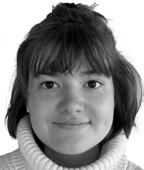
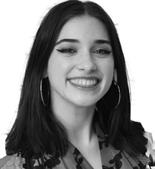
Have you ever wondered what happened to Fordham’s beloved live ram version of our mascot?
The last live ram, Rameses XXVIII, died in 1978 and was replaced by what we all know today: a student dressed in a ram costume. Until last semester, I did not know that Fordham had previously had a live ram as a mascot, but I have adopted the firm belief that the university should bring the tradition back.
Return of the Ram(eses)
whopping 53 years, after which the university replaced the live mascot with an animal costume. Given the (often dramatic) losses of the 28 Rameses of the past, if a live ram is reintroduced, it is important that Fordham takes extra precautions to ensure the ram lives a long and happy life.
While I am in favor of bringing back a live animal mascot, I know that the practice of having them can quickly become unethical. People for the Ethical Treatment of Animals, better known as PETA, gives the practice of live animal mascots a grade of F. Arguments against the practice cite animal abuse due to the stressful environments of sporting events; insufficient habitats; problematic school traditions revolving around harassment and aggravation toward the mascot; and general concerns over the animal’s mental, emotional and physical health.
as dogs, cats, horses, livestock and small rodents — should be allowed with strict guidelines and regulations.
One key issue with hosting a live ram is that livestock animals are social creatures. Animals that live in flocks or herds must socialize with others from their species. It would make the most sense for the Rameses’ reign to return with not just one ram but a pair. Rams do not like living alone, so their comeback would be more successful if there were multiple. Facing isolation places a social animal under extreme stress and makes them more susceptible to contracting illnesses. Due to the ethical concerns over the premature and early deaths of many of Fordham’s previous live mascots, having a pair of rams could become a protective factor for their health and could allow them to live longer.
Michael Lewis, a marketing professor at Emory University, made a surprisingly simple observation about why schools use live mascots: “Human beings love animals.” Live mascots function as a more motivating and adorable representation of a university than a person in a suit. (No disrespect to the people who bring Rameses to life.) Seeing a live animal as the face of a university is a more compelling embodiment of the school for students, alumni and fans.
The benefits of having a live ram as Fordham’s mascot are not limited to raising morale. The ram would be a great marketing tool and could bring more
exposure to the university, offering opportunities on social media and in the news, especially in those feel-good segments at the end of broadcasts. With this strategy, Fordham could reach more potential applicants.
The caretaking of Rameses also enables the creation of new job opportunities for professionals in farm animal caretaking and veterinary services. Caring for Rameses would offer an opportunity for Fordham students to gain experience that would look great on their resumes, which could come in the form of an internship or a work study position.
In addition, Rameses’ presence could lead to the creation of a new animal care program, similar to that of Penn State University’s; a new animal science major exclusive to the Rose Hill campus; and additional courses related to animal caretaking. This academic program and course expansion would enable Fordham to venture into more applied science fields and would appeal to students interested in these fields.
With a previous dynasty of 28 rams, it is no question that there is precedent for a live mascot at Fordham. The first Rameses made his debut in 1925, and the great dynasty ruled for a


The use of exotic and nondomesticated animals, such as the University of Texas’ Longhorn steer, the University of Auburn’s golden eagle, the Air Force Academy’s falcon and Baylor University’s black bear, needs to be banned outright. However, domesticated animals — such
Fordham, Don’t War With PETA
If there was a room in which all members of the Fordham community were present — staff, students, administration, the Argo Tea ladies, etc. — I cannot imagine a single person would raise their hand when asked: “So! Who’s going to take care of the live ram?”
Maybe this is a bleak outlook, but I doubt anyone would stand up, impassioned by their secret love of recreational veterinarianism, and donate the level of care and devotion a live animal needs.
If a live ram were introduced to Fordham’s campus, to graze in the cigarette butt-ridden lawn of Edward’s Parade, I believe it would ultimately end in disaster.
Fordham doesn’t exactly have a shining history when it comes to our live mascots. We kept actual rams as our mascots from 1925 until 1978, which resulted in a string of intrigue, murder and cruelty that I’m surprised PETA (People for the Ethical Treatment of Animals) doesn’t include as a header on their website.
The first few rams (all named Rameses, an indication of the failing dynasty to come) were kidnapped and met their ends in slaughterhouses. The exception was Rameses III, who was reportedly extremely aggressive, escaped several times and interrupted local train schedules until he had to be ceremonially executed by the Fordham Rifle Team.
I won’t give a full bloody history of the rest, as I wouldn’t
want to rob someone of a compelling and frankly horrifying book idea, but honorable mentions include Rameses XVIII, whose shed was burned down and who later died of alcohol-related liver disease; Rameses XXI, who was kidnapped so often he spent more time at rival schools’ campuses than at ours; and Rameses XIX, who was dyed green by Manhattan College students and died after a long battle with the flu, running up steep medical bills for Fordham to pay.
Rice Krispies Treats and killing it instantly. How would a lone ram defend itself against college students returning from a night out?
Any live animal deserves a proper habitat and adequate care to ensure its well-being. As a university in the middle of New York City, we simply don’t have the facilities or the staff required for the upkeep of a live ram at either campus.
Even if livable conditions were established, we would have to consider the cost of crafting a biome for a single ram in Manhattan or the Bronx. I assume ram food costs money, and I can’t imagine any field crops would thrive on Fordham’s campus, especially at Lincoln Center.
Fordham’s monetary distribution is questionable at best, and the university community is already frustrated by the 6% increase in tuition for next year.
This pairing would also make for better conditions for when the rams attend events, as they could reduce stress for one another by having their responsibilities divided. In regard to game attendance, the rams either should not attend games at all or only be brought out at one part of the game — be that before, at halftime or afterward. Attending a whole game would force the rams to be subjected to the loud, crowded space and bright lights, which is not an appropriate situation or environment for them.
With all these considerations in mind, is there an ethical way to host a ram at Fordham? Yes. We can bring back Rameses to continue the live ram dynasty, but with a modern and ethical twist.
While this might make one wonder if animal cruelty was the only other pastime before the invention of cable television, I wouldn’t devote such an optimistic outlook to the present, either.
I enjoy most of the people at Fordham. But, I don’t find that mutually exclusive with the fact that in every group of co-eds I’ve ever been in, there’s someone who gets intoxicated and does something unspeakable for Snapchat, and then everyone has to live with it. (One time I saw a drunk young man kick a pigeon, and I still think about it every day.)
It would only be a matter of time before a student hurt the ram — by dyeing it, taking it to their dorm, or trying to feed it a
I don’t think that — considering the list of things that need financial attention — getting a live animal to just hang out should be a top priority. There’s brown mold in my dorm right now as I write this. (Seriously, anyone reading this, please help with the mold in my dorm.)
There are facilities and student programs that deserve the attention and money that would go toward this lone ram. Would it be cool to walk around campus and turn to see a farm animal? Maybe, yeah. Every time I’m on a road trip and I see cows, I yell “Cows!” But they’re on a farm, where they’re supposed to be. As much as I might love to yell “Ram!” multiple times per day, it would be unfair
to the animal. Sometimes I even feel bad for the squirrels who live at Rose Hill. I know there’s a better life waiting for them somewhere. I couldn’t imagine the dismay I would feel seeing a real ram. They have big eyes and look sad at the best of times.
Any gratification I might get from seeing a ram would be for me, not the ram. He wouldn’t be happy to see me. He wouldn’t even know me. I wouldn’t want to condemn him to an existence on a college campus. Even if he only shows up at the football field and the basketball courts, his presence would solely be
for the benefit of the students. The ram doing a lap at halftime might be a nice Instagram story, but it would undoubtedly be a harrowing experience for it. Besides, the Rameses mascot, that genius in a suit, would be out of a job. They walk on two legs and can make people do the wave. No animal can do that.
I’m not a perfect person. I’m only vegetarian 75% of the time. But I could not, in good conscience, support trapping a ram in a life of watching overcaffeinated college students vape in the quad — not after all we’ve done.
Let’s make 2023 not only the year of the rabbit, but also the year of the ram
A live ram mascot would be irresponsible given Fordham students’ track record with the animals
COURTESY OF THE FORDHAM UNIVERSITY ARCHIVES
Fordham could dedicate a specific area of campus as an ethical habitat for the ram.
COURTESY OF THE FORDHAM UNIVERSITY ARCHIVES
Fordham had a live ram from 1925 to 1978. It would be unethical to revive this archaic tradition.
With a previous dynasty of 28 rams, it is no question that there is precedent for a live mascot at Fordham.
GRACE THOMAS Contributing Writer
It would make the most sense for the Rameses’ reign to return with not just one ram but a pair.
12 Opinions April 12, 2023 THE OBSERVER www .fordhamobserver.com
As much as I might love to yell “Ram!” multiple times per day, it would be unfair to the animal.
Arts & Culture
‘Have No Fear, the Crew Is Here’
A look inside the group’s founding, goals for the future and the content creation process
By CAROLINE SENSENIG Staff Writer
If you’re a student at Fordham Lincoln Center, chances are you’ve heard of the Have No Fear Crew. This group of Fordham seniors creates YouTube, TikTok and Instagram videos, with content ranging from man-on-the-street interviews to challenges and vlogs filmed on the university’s campus and around New York City. Since their founding, in spring 2021, they have attracted thousands of followers across their social media accounts and gained over 2 million likes on TikTok.


The Have No Fear Crew consists of four members: Montse Ruiz de Gamboa, Arul Mollin, Wei Chen and Jenny Bocchicchio, all Gabelli School of Business at Lincoln Center (GSBLC) ’23. They were brought together through GSBLC, and what began as a casual friend group grew into a tight-knit content creation team when the group formed the Have No Fear Crew.
videos and their vlogs from when they studied abroad in London. While the crew strives to step outside of their personal bubbles while filming, their first priority is to make sure the people in their videos feel comfortable and welcome.
“We’re also college kids, so we want to be as relatable to the students as we can. We’re not any different than anyone else here,” Mollin said. “We wanted to create something that other people could laugh at, be inspired by and things like that.”
The crew adds an inviting catchphrase at the end of their YouTube videos: “Have no fear, the crew is here,” a simple yet sweet and friendly signoff.
The Content Creation Process
The crew spends many nights brainstorming to come up with new video ideas. They have meetings once or twice a week to discuss what they are going to work on for the rest of the month and where they are at with any current projects.
Prior to filming, they consider how they will market and promote their videos and attract sponsorships. They also work out who they want in their videos, as well as the camera angles and the equipment they are going to use. Because many of their regular viewers are Fordham students, they try to come up with videos that will engage the community.
“We have such a special friendship that for many people is hard to find,” Ruiz de Gamboa said. “The four of us feel like brothers and sisters.”
Because they film around Fordham, the crew has the opportunity to interact with many students on campus through interviews and conversations. This engagement with the university community has made them a familiar face for Lincoln Center students.

“It is nice at a campus without any sports or traditional forms of exercising school spirit, to have something that people get excited about,” Caroline Hyde, GSBLC ’25, said. “You can tell that the people involved really enjoy it which makes it entertaining to watch.”
Their shared love for social media and passion for making content brought the Have No Fear Crew together. A few of their favorite videos they have made thus far have also created some of their fondest memories, such as their hide-andseek series, their speed dating
Sometimes, they will look to other YouTubers and analyze videos to see what sparks their own interests or discuss things they have seen before to figure out what they would like to do next.
“We watch a lot of YouTube videos together, and we study them and critique them. We get a lot of our influence from Kelly Wakasa, MrBeast, Jubilee and the Sidemen,” Chen said.
The filming and editing process varies greatly depending on the kind of video, the length, how many people are working on it and which social media platform it is for. It can take anywhere from two hours to a week to edit one video.
“The more camera angles that are involved and the more raw footage there is, the longer it takes exponentially,” Chen said.
To help with the amount of time needed, the crew has found specific jobs for each of them to take on. The editing is broken up between everyone, since they all have the necessary experience.
In terms of the work division, Ruiz de Gamboa stated that she’s
mostly in charge of Instagram posts and reels, while Bocchicchio focuses on TikTok editing and posting.
Chen and Mollin typically take care of the networking, and they are usually the ones in front of the camera talking to people. Mollin is also credited with coming up with the crew’s name.
“He is one of our most outgoing personalities in our friend group, and he’s always lived behind the principle of just doing what you love and not caring about living someone else’s life and getting other people to do that too,” Chen said.
Of course, the group occasionally encounters obstacles, such as timing, mixing personal and professional lives, and consistency in content creation.
“When you’re so forced to stick to a schedule, it sometimes limits creativity,” Mollin said.
They have resolved these issues by creating a shared calendar, communicating, looking out for each other, and posting at least once a week. In the end, making and uploading content is a team effort — everyone does a little bit of everything to get the job done.
What the Future Holds
As content creators, the members of the Have No Fear Crew hope that their viewers perceive them as a group of friends making videos together and appreciating their time at Fordham and in New York.

“There’s a lot of hard work involved (in) showing what’s so great about the city and what’s so great about Fordham,” Ruiz de Gamboa said.
All four of the members will be graduating in May, but they plan to continue their YouTube channel.
Right now, they are working on defining what the Have No Fear Crew is without Fordham, as most of their content has been centered on the university.
“It’s possible for us to continue this after college, and we all want to, so that’s what we’re planning on — that’s where we need to pivot the channel towards,” Chen said.
“I think we did a really good job of bringing our friends and the community together, especially post-pandemic,” Bocchicchio said. She added that she hopes their group can be similarly remembered for being a source of “good vibes.”
“We want to be known by the time we graduate as a group who inspired people, took people out of their comfort zone in a good way, and really forced everyone to be comfortable in their own skin,” Mollin said.
PHOTOS COURTESY OF THE HAVE NO FEAR CREW
The members of the Have No Fear Crew — from left to right, Arul Mollin, Jenny Bocchicchio, Wei Chen and Montse Ruiz de Gamboa, all GSBLC ’23 — proudly pose wearing their merch.
Fordham students gather around Mollin and Chen on Fordham’s Outdoor Plaza to participate in a video.
The Have No Fear Crew, preparing to conduct interviews with pedestrians in Central Park, ask the classic question, “What Are You Listening To?”
The Have No Fear Crew dedicates a large amount of time to generating content that will engage Fordham students and the broader community.
“ We wanted to create something that other people could laugh at, be inspired by and things like that. ”
Arul Mollin, GSBLC ’23
Arts & Culture Editor Isabella Gonzalez April 12, 2023 THE OBSERVER
Miss West Virginia Teen USA Takes on Big
City Dreams
As a dancer and a pageant queen, Emma Kitchen, FCRH ’26, has discovered her spotlight in New York City
By LAUREN MOON
Contributing Writer
The cliche of a “small-town girl with big city dreams” often gets tossed around, but nothing rings truer for Emma Kitchen, Fordham College at Rose Hill (FCRH) ’26 and Miss West Virginia (WV) Teen USA 2022. For Kitchen, representing her home state of West Virginia as a pageant queen and dancing for the Fordham dance team is the perfect combination to achieve these dreams.
Her First Love West Virginia imbued Kitchen with soaring ambitions. Her home spotlighted her passion for dance, which she made her platform for Miss WV Teen USA.
“I think my work ethic definitely comes from my home state of West Virginia and the way I work and the way I view how I work,” Kitchen said.
Since the age of 6, Kitchen’s devotion to dance inspired her to share the delights of performing with other people around her. At the age of 14, she taught the power of dance as a form of exercise, community and expression to children at a dance studio in hopes of lifting a new generation of young dancers. Witnessing a reflection of her younger self through the kids, she said that “it reminded me of where I started, and it kind of renewed my joy of dance.”
Chasing the same love for the art, she established herself as a member of Fordham’s dance team at the start of her first year. Balancing college classes, the dance team and her duties as Miss WV Teen USA has been a little scary for a first-year, according
to Kitchen. She added that the support of her teammates on the Fordham dance team made the transition easier for her.
Dancing to Her Dream
On her way to Columbus, Ohio, 4-year-old Kitchen was dressed exactly like the Molly McIntire American Girl doll clutched between her arms. Kitchen was traveling with her family from Parkersburg, West Virginia, to see the Radio City Rockettes on tour. As she watched them perform, she fell in love.
Their “classic, timeless movement quality and performance” inspired her, she said, empowering her to establish herself as a member of Fordham’s dance team with dreams of being a Rockette.
MEDIA WITH A MISSION
The Rockettes are not her only plan, however. As a Fordham student, Kitchen is pursuing a political science major on the pre-law track with hopes of becoming an attorney. She emphasized that she enjoys learning about everything and seeing things from different perspectives.
Kitchen believes in creating the right balance between career goals and artistic aspirations. “My mother always said it’s important to live a happy life where you have a dream and a reality,” she recalled. “(The) Radio City Rockettes are my absolute dream.”
After her first pageant crowning at age 15, Kitchen began entering West Virginia’s “Fairs and Festivals” competitions, which connected her to dance professionals and opportunities.
In 2019, Kitchen joined the Rockettes’ summer intensive program, where she connected with Rhonda Malkin, a Rockette. She began training with Malkin in order to audition for the company at the age of 18.
The same week that she signed up to compete for Miss WV Teen USA, she rushed to catch a train to audition for the Rockettes and tour the Fordham Rose Hill campus. To her, the chaos of it all seemed like a sign.
Although she was not selected as one of the 86 dancers joining the Rockettes’ ranks among 1,000 auditionees, Kitchen explained that she “was just so inspired by so many girls, and I was there. I made it. I made it to the audition.”
Through pageantry and dance, Kitchen earned scholarships and created opportunities that made the vision of attending a school like Fordham achievable.
As a dancer, Kitchen understood what it meant to face rejection, explaining that the dance world “desensitized” her to it at an early age.
“When you live in the dance world, you kind of have to realize that you’ll get 10 no’s before you get a yes,” she said.
Through pageantry, she continued to erase her fear of failure. To her, a rejection isn’t a “no,” it’s a “not yet.”
“I believe what is meant for you will always find you as long as you do everything in your power to help achieve it,” she said.
Pageant Life
The pageantry scene can be physically and mentally demanding. Kitchen explained that she
always tries to remind herself that falling into the trap of comparison is not a productive mindset, but “it’s very intimidating to walk into a room with all these like beautiful, young, accomplished women.”
However, Kitchen said that she understands that “through that comparison, you realize that what makes you different is OK, and what makes you different is your strong suit.”
Because she grew up dancing on the stage, a strong stage presence for pageantry came easily for Kitchen. She believes that “getting up there and being completely comfortable with who you are, not only just your appearance but what you can bring to the table” are elements that make a pageant special.
Dance and School
Being one of three first-year students to make the Fordham dance team, committing time to football games and basketball tournaments was a new responsibility.


One of her captains on the dance team, Rebecca Chretien, FCRH ’24, said she admires Kitchen’s commitment to dance.
“She’s so passionate, and so I think if she just keeps working and keeps going at it, I think she can do pretty much anything that she wants,” she said.
The responsibility of representing her state as Miss WV Teen USA requires her to learn how to balance life as a student, dancer and leader. For Kitchen, there is no such thing as looking back on the “no’s.” With confidence and poise, she is dancing her way to front and center, headed straight for the “yes.”
MASTER OF ARTS IN PUBLIC MEDIA
VISIT
TO
» Choose between two tracks: multiplatform journalism or strategic communication.
» Develop storytelling skills and multimedia production expertise in graphics, audio/video editing, and web/mobile design.
» Take advantage of internships and courses at WFUV, WNET, other media outlets, and public-interest and advocacy organizations.
» One-year, full-time program

The Fordham master’s program in public media combines academic inquiry, hands-on experience, and a focus on storytelling for social justice and civic engagement.
FORDHAM.EDU/PMMA
LEARN MORE.
» Evening courses available at Rose Hill and Lincoln Center THE QR CODE TO JOIN US FOR AN INFORMATION SESSION
SCAN
ALICE MORENO/THE OBSERVER
14 Arts & Culture April 12, 2023 THE OBSERVER www .fordhamobserver.com
Kitchen is able to continue her love of dance on the Fordham dance team.
Drag Show Brings the Heat on Trans Day of Visibility

Fordham’s Fashion for Philanthropy’s night of song, dance, drag and community raised over $650 for charity
 By AVERY LOFTIS Asst. Arts & Culture Editor
By AVERY LOFTIS Asst. Arts & Culture Editor
Some performers asked to be identified only by their stage names due to privacy concerns.
In celebration of the annual Trans Day of Visibility on March 31, Fordham’s Fashion for Philanthropy (FFP) club hosted a drag show in the 12th-Floor Lounge of the Lowenstein Center. Fordham students took center stage at the event. Ms. Worldwide, Gabelli School of Business at Lincoln Center (GSBLC) ’25, who requested to not be identified to keep their personal and professional lives separate, DJed while students celebrated, ate snacks and danced.
There were also drag sets by Dev Doee, Fredddie Bender, JanelleNo.5, and Twinkle Toes (Jacob Ruperto, GSBLC ’23). The event concluded with a question-and-answer session with the performers.
The idea for the drag show came about when Meilin Morefield, GSBLC ’24 and FFP president, went through the club’s Instagram archives. She was FFP’s secretary at the time and noticed that Fordham had held drag shows in 2018 and 2019.
“It was such a dead club, like only three people came to the meetings, and I was like, ‘I know FFP could be something great,’” she said.
Before the performers went on, Ms. Worldwide played “Bad Romance” by Lady Gaga as students funneled into the room and onto the dance floor, where people were enthusiastically singing the lyrics with their friends. There were a total of 163 attendees who checked in before the doors opened, according to FFP Treasurer Ernie Perez, Fordham College at Lincoln Center ’24.
Those dancing in their seats transitioned to standing in their seats to see the first drag queen, Dev Doee, who is based in Brooklyn, over the crowd of people. Dev Doee showcased her flexibility to Beyoncé’s “CUFF IT”; she was followed by Twinkle Toes’ moves to a Wendy Williams/Dua Lipa mix and Fredddie Bender’s performance to “Anti-Hero” by Taylor Swift.
Throughout the night, FFP held a raffle in collaboration with New York City businesses, such as The Guggenheim Museum and 54 Below, with the goal of raising $500 for the nonprofit New Alternatives for LGBTQ+ Homeless Youth. New Alternatives provides support to LGBTQ+ youth through educational services and community-building activities. The nonprofit supports them throughout their transition from the shelter system to healthy lives.
By the event’s end, students had contributed over $650 for queer homeless youth, with $163.80 raised within the miracle minute, in which FFP aimed to reach their $500 goal before the second set of performances, according to Perez.
“(With) the current state of our world and all the legislation, we thought it’d be really important to raise our voices as students,” he said.
Other clubs, students and the greater New York City community came together with FFP to celebrate LGBTQ+ trail blazers. Fordham Lincoln Center’s radio station, Wavelengths at Lincoln Center, and the PRISM LC club supported the facilitation and advertisement of the event on their respective Instagram pages. Jess Clauser, Fordham College at Rose Hill ’23, also presented an opportunity for students to draw what their gender was that day, a project they were doing for their visual justice course.
Morefield said that she wants this event, which highlights student expression, to occur annually.
“I just hope that we can continue to put on events that create a more welcoming community at Fordham,” she said. “We’ve been working really hard to build a space where students can come and just have fun and express themselves.”

An emblem of expression, drag queen JanelleNo.5, who has been performing drag for about eight years, closed out the show with “It’s All Coming Back to Me Now” by Celine Dion. She opened her dress to reveal a bejeweled ensemble on the ending lyrics that speak to openness and possibility, summing up a day of visibility and a Fordham event that welcomed everyone.
 Students dance and enjoy the night while celebrating Trans Day of Visibility.
Music was provided by DJ Ms. Worldwide, GSBLC ’25.
Twinkle Toes’ wig flies across the stage as they lip-synch to a medley of “Victorious” songs, such as “Make It Shine” and “Beggin’ On Your Knees.”
PHOTOS BY ALICE MORENO/THE OBSERVER
Students dance and enjoy the night while celebrating Trans Day of Visibility.
Music was provided by DJ Ms. Worldwide, GSBLC ’25.
Twinkle Toes’ wig flies across the stage as they lip-synch to a medley of “Victorious” songs, such as “Make It Shine” and “Beggin’ On Your Knees.”
PHOTOS BY ALICE MORENO/THE OBSERVER
www .fordhamobserver.com THE OBSERVER April 12, 2023 Arts & Culture 15
Dev Doee performs a vogue dance as the audience films her.
Crossword: Once a Ram, Always a Ram un & ames

1. The best ever (Abbr.)
5. Medication to relieve nasal congestion
10. A ride-share company, with food delivery services
14. ___ ___ the legend goes; according to the story
15. They ___ ___ more; deadly euphemism
16. Get off my ___
17. Actress Long and dancer Sioux, for two
18. *FCRH ’08 graduate and current singer-songwriter
20. ___ Dei: the Lamb of God
22. Pickled ginger slices served with sushi?
23. *FCLC administrator with an art history background
27. Facebook or Twitter, for example (Abbr.)
28. “Party in the ___,” by Miley Cyrus
29. Infidel
32. Belonging to the Persian country
34. ___ butter
35. *What 18, 23, 51 and 56 Across will always be (4 wds)
41. Steel item on a horse’s hoof
42. French sociologist Durkheim
43. ___ ___ Universe pageant
47. Chemical suffix
48. NBC television program with Simon Cowell
55. What a ram or 12 Down is
56. *Founder and archbishop of Fordham
61. Actor Gellman from “The Lizzie McGuire Movie”
62. Reassuring words: ___ ___ your side
63. Switzerland river
64. Momentary flows of electric current when two objects come into contact (Abbr.)
65. Nasal liquid
66. Spaces, as in a coin machine or allotted broadcasting time
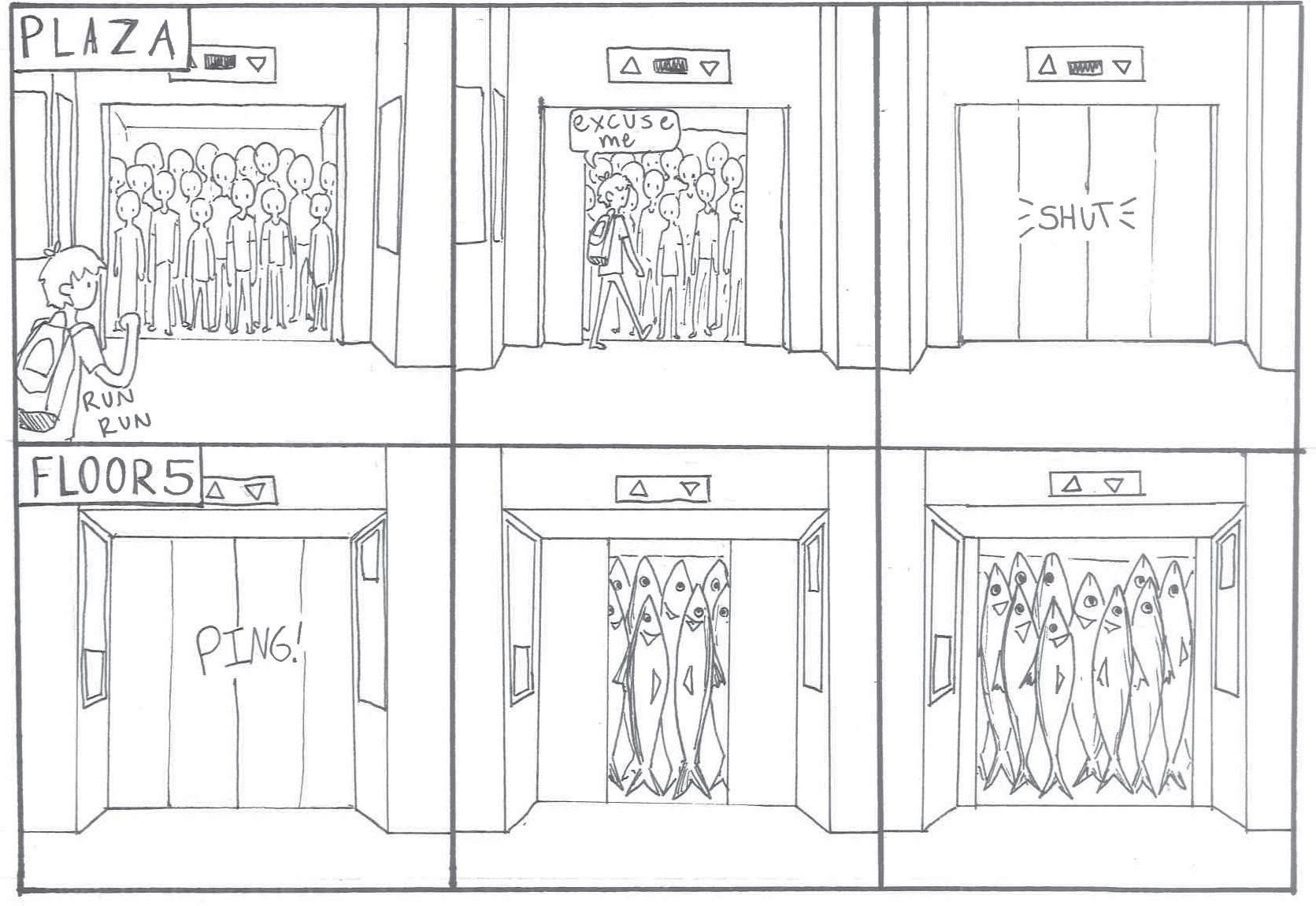
67. Defecated, informally
1. Gamete producing organs

2. Christian scholar of Alexandria; writer of “On the First Principles”
3. Part of the Hatha yoga practice
4. ___ the ___ and back: the daylight version of this loving phrase?
5. Stock abbreviation for U.S. public air transportation service

6. Aromatic
7. “___ Circulation,” opening song from Bakemonogatari
8. Inside a curved structure? (2 wds)
9. Not a chance! (2 wds)
10. One of the Aesir known for his beauty and skill with bow and skis
Instructions: Each row, column and 3×3 box must contain the numbers 1-9 exactly once.
51. *Late FCRH ’49 graduate and Dodgers sportscaster
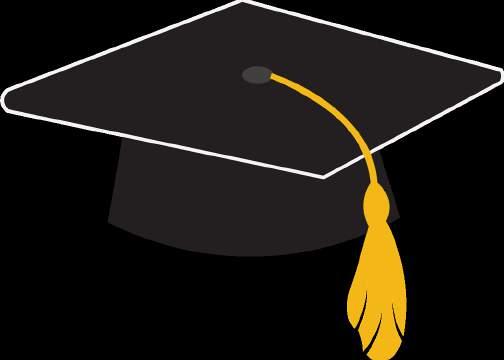
54. American pundit and writer Jonathan
11. It’s easy to surpass expectations when this is set low
12. Female ram
13. Surgery dividing the stomach in two (Abbr.)
19. Bollywood actress, model and winner of the Miss India International of 2007, Gupta
21. Lizard prefix
24. One of the eight American uniformed services
25. “___ ___, hi / I’m the problem”
26. Surprised greetings to a friend perhaps (2 wds)
30. Unagi
31. “No” Vote
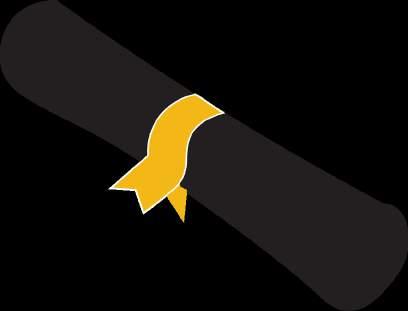
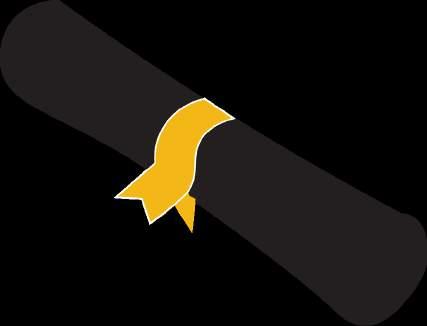
32. The ___ ___ value most could be money or love
33. Feminine pronoun
35. Californian time zone
36. Mouth opening sound
37. ___ ___ Wade
38. Radiating; sending forth
39. Throws out
40. Baldwin and Bowm
44. 2.54 centimeters in one
45. Straight downhill run on skis
46. Girl who enjoys swimming and surfing perhaps? (2 wds)
48. What you may need when walking a dog
49. Daughter of Chucky
50. Court recorder of verbatim transcripts on an antiquated keyboard

52. “___ Kai-Lan”
53. Hesitant affirmation (2 wds)
56. “___ ___ for Judgment”
57. Every in Rx’s
58. “The Last of Us” can be found here
59. WaPo and WSJ rival?
60. His or her in Nice
Lowenstein Plaza 7 Minutes Before Class.
BY HANNAH BERGGREN
BY
IRENE HAO
Fun & Games Editor Irene Hao April 12, 2023 THE OBSERVER
OF Down Across
by Tara Lantell and Giada Evangelista 5 3 8 4 7 1 8 2 7 1 4 6 3 5 9 7 2 8 9 6 3 9 8 8 6 4 7 2 2 4 1 7 3 6 4 1 3 8
FORDHAM UNIVERSITY Graphics
BY IRENE HAO
Sudoku
































































































 By AVERY LOFTIS Asst. Arts & Culture Editor
By AVERY LOFTIS Asst. Arts & Culture Editor

 Students dance and enjoy the night while celebrating Trans Day of Visibility.
Music was provided by DJ Ms. Worldwide, GSBLC ’25.
Twinkle Toes’ wig flies across the stage as they lip-synch to a medley of “Victorious” songs, such as “Make It Shine” and “Beggin’ On Your Knees.”
PHOTOS BY ALICE MORENO/THE OBSERVER
Students dance and enjoy the night while celebrating Trans Day of Visibility.
Music was provided by DJ Ms. Worldwide, GSBLC ’25.
Twinkle Toes’ wig flies across the stage as they lip-synch to a medley of “Victorious” songs, such as “Make It Shine” and “Beggin’ On Your Knees.”
PHOTOS BY ALICE MORENO/THE OBSERVER








